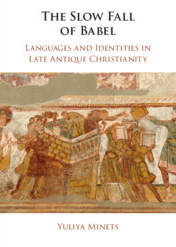
Joshua Stuchlik and Yuliya Minets, both 2019-2020 Faculty Fellows at the Notre Dame Institute for Advanced Study, have each published a book with Cambridge University Press based on the research they conducted while at the NDIAS.
Stuchlik is Associate Professor of Philosophy at the University of St. Thomas (St. Paul) and Minets is Assistant Professor History at Jacksonville State University. Stuchlik’s book is titled Intention and Wrongdoing: In Defense of Double Effect; Minets’ book is titled The Slow Fall of Babel: Languages and Identities in Late Antique Christianity.
From the Publisher:

According to the principle of double effect, there is a strict moral constraint against bringing about serious harm to the innocent intentionally, but it is permissible in a wider range of circumstances to act in a way that brings about harm as a foreseen but non-intended side effect. This idea plays an important role in just war theory and international law, and in the twentieth century Elizabeth Anscombe and Philippa Foot invoked it as a way of resisting consequentialism. However, many moral philosophers now regard the principle with hostility or suspicion. Challenging the philosophical orthodoxy, Joshua Stuchlik defends the principle of double effect, situating it within a moral framework of human solidarity and responding to philosophical objections to it. His study uncovers links between ethics, philosophy of action, and moral psychology, and will be of interest to anyone seeking to understand the moral relevance of intention.

This is the story of the transformation of the ways in which the increasingly Christianized elites of the late antique Mediterranean experienced and conceptualized linguistic differences. The metaphor of Babel stands for the magnificent edifice of classical culture that was about to reach the sky, but remained self-sufficient and self-contained in its virtual monolingualism – the paradigm within which even Latin was occasionally considered just a dialect of Greek. The gradual erosion of this vision is the slow fall of Babel that took place in the hearts and minds of a good number of early Christian writers and intellectuals who represented various languages and literary traditions. This step-by-step process included the discovery and internalization of the existence of multiple other languages in the world, as well as subsequent attempts to incorporate their speakers meaningfully into the holistic and distinctly Christian picture of the universe.
Originally published by at ndias.nd.edu on December 20, 2021.